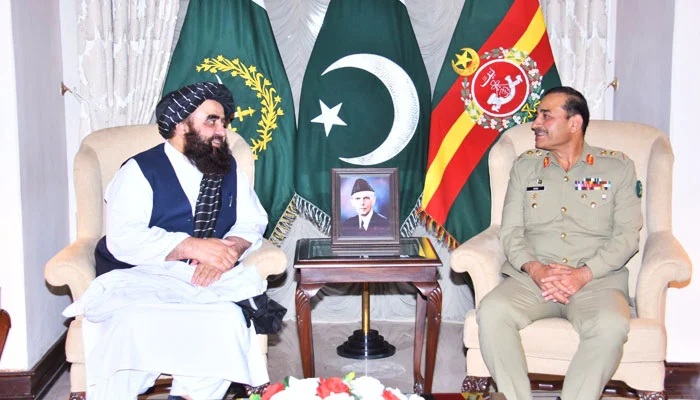Chief of Army Staff (COAS) General Asim Munir has stressed the need for enhanced cooperation between Pakistan and Afghanistan to collectively tackle the common challenges of terrorism and extremism in the AfPak region. According to an official press release of the Inter-Services Public Relations (ISPR), the visiting Afghan Acting Foreign Minister Amir Khan Muttaqi called on the Army Chief on Sunday and the two leaders discussed issues of mutual interest including aspects related to regional security, border management, and formalization of bilateral security mechanisms for improvement in the current security environment. The Afghan Acting Foreign Minister appreciated Pakistan’s traditional support for the people of Afghanistan and acknowledged the important role that the country continues to play in facilitating peace and development in Afghanistan. Muttaqi also expressed his desire to work closely with Pakistan to promote regional stability and economic prosperity. During the meeting, both sides agreed on the importance of maintaining regular contact to strengthen bilateral ties and address issues of common concern.
Pakistan and Afghanistan have been at odds over the recent months because of an unprecedented upsurge in terrorism inside Pakistan after the proscribed Tahreek-e-Taliban (TTP) called off its ceasefire in late 2022. The banned militant group has a commonality of belief and ideological association with the Afghan Taliban and enjoyed sanctuaries and passive support from Kabul over the past months. The Pakistani authorities had regularly urged Kabul to eliminate terrorist safe havens and take action against the banned terror outfits camped and operate out of Afghanistan. However, a gradual downturned had been witnessed in the bilateral relations of both neighbors after the Afghan interim rulers denied Pakistan’s accusations and refused to cooperate with Islamabad over the issue of terrorism.
Realistically, Pak-Afghan ties mostly remained at low par in the past because Pakistan’s western neighbor often adopted an animus position in respect of its policies with regard to Pakistan. Starting from opposition to Pakistan’s membership in the United Nations and a refusal to respect Pakistan’s territorial sovereignty, the Afghan leaders had mostly tried to leverage their influence inside Pakistan. There had been the least cooperation between the militaries of both neighboring nations in the defense and security domains which seriously affected the security interests of both countries throughout history. Interestingly, Pakistani strategists had always sought a strategic depth in Afghanistan and their efforts to install a friendly government in Kabul could not bear fruit so far. The Taliban who are commonly known as a pro-Pakistan militant faction had pursued more hostile policies toward Pakistan than the Afghan Republicans who ruled in Afghanistan. Earlier, the Afghan Republicans raised the slogan of Lar-o-bar Afghans while the Taliban leaders aligned with the banned militant group instead of the state of Pakistan.
At this point in time, the entire world is embattled with severe economic, and energy crises while the menace of terrorism, political unrest, and internal violence pose serious risks to the peace and stability in the AfPak region that reminds the leadership of both countries to pause their political agendas and pursue collective good and wellbeing of their people. The government and the people of Pakistan owe utmost sympathy and brotherhood to their Afghan brethren who suffered unimaginable hardships and miseries due to the persistent conflict and violence in their country over the past decades. Currently, Afghanistan is facing extreme economic, security, and humanitarian challenges that not only need the due attention of Afghan rulers but also demand timely economic and security assistance from the global community and Pakistan. At the same time, there is huge potential for regional cooperation and development between Pakistan, Afghanistan, Central Asian States, and China but lingering violence and instability in Afghanistan is a persistent hurdle in the realization of that potential in the region. A lot has been said and communicated to the Afghan interim government by Pakistan and the rest of the world to align its step with the world that would not only pave the way for its global recognition but also will unleash enormous hidden prospects of goodwill and sustainable economic development. Hence peace and progress await the sane decisions of the leaders that will lead the nations to their destinies, otherwise trading in bloodshed will ruin the whole region.







